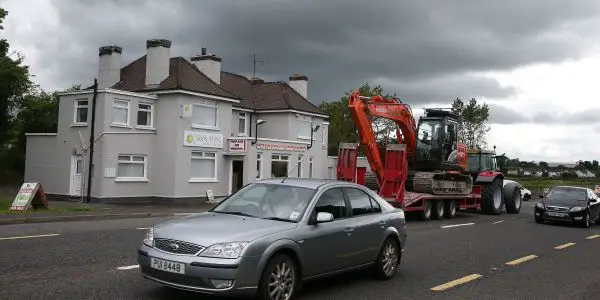Traffic thundering through the invisible Irish border on the main road between Londonderry and Letterkenny is relentless.
Seconds into the Republic side – noted from a change in speed limits from miles to kilometres – a thriving hub of businesses has sprung up in recent years around the once sleepy village of Bridgend.
The old Irish Customs post is now a fireplace showroom.
There is no evidence of the once heavily fortified and towering British Army checkpoint that once loomed over the Northern Ireland side.
Several filling stations do a roaring trade from Derry motorists taking advantage of cheaper fuel.
Traders selling everything from log cabins to organic wheatgrass promote favourable sterling to euro exchange rates.
A clutch of cafes sate the appetites of cross-border workers and day-trippers in need of a coffee and some food.
Long gone are the days of endless tailbacks, vehicle searches and cross-examination about one’s intended journey.
Gary Kelly, a transport contractor having a drink in the Frontier Hotel on a day off, crosses the border every day of his life.
Living in Northern Ireland, he buys his fuel at Bridgend and fears a surge in prices in the event of a Brexit.
“If the UK votes to leave, it will affect fuel prices drastically. I think it will affect prices all round drastically,” he said.
Across the bar from him, taxi driver Pat McCluskey is more concerned with the prospect of renewed border controls.
“I remember it years ago, and there were queues all the time,” he said. “It will be worse now because of fears about immigrants.”
On the other side of the teeming road from the Frontier Hotel, Michael Faulkner runs a bureau de change, called EuroXchanger.
He calculates 50,000 cars pass his outlet every day.
“I think everybody is concerned, nobody wants to go back to what it was 20 years ago when there was a physical border,” he said.
“My personal view is that it won’t go back to that, but there would be some curtailment, whether in business terms or the movement of people, there would be some sort of restriction.
“Any sort of restriction here won’t be good for businesses on the border that’s for sure.”
But despite all the fears and warnings, many people going about their daily business on the border have no view on the upcoming referendum.
Some ask what it is about.
Others say they are so disinterested they won’t even vote.
Among them is Martin McCool, a taxi driver, crossing the border since he was a child, and who remembers the military checkpoints and Customs posts.
“It was hectic when the Army was on the border and the police, but the Customs will not make any difference,” he said.
“It’s not going to be a big deal. It will make no difference to my life.”
